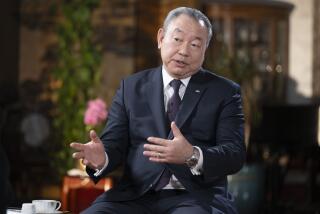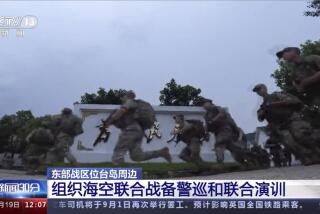Bush Visit in the Cards for China’s Heir Apparent
- Share via
BEIJING — The man expected to take over as leader of the world’s most populous nation left today on a diplomatic tour that will bring him to Washington and a probable meeting with President Bush.
Chinese Vice President Hu Jintao is scheduled to stop in Singapore and Malaysia before traveling to the U.S. on Saturday for a weeklong visit that will allow American officials to take further measure of the man nearly everyone believes will succeed President Jiang Zemin within a year.
Hu’s visit comes as Sino-U.S. relations, which enjoyed a revival after Bush came to China in February, have hit another rocky patch over what Beijing perceives to be an alarming tilt by the Bush administration toward Taiwan.
The subject of Taiwan is likely to dominate Hu’s agenda in Washington, which includes an expected meeting with Bush, who invited the vice president to the U.S. while in Beijing. The men met for the first time then, chatting briefly before Bush delivered a speech at Hu’s alma mater, Qinghua University.
The Chinese government has been disturbed in recent weeks by a White House decision to allow Taiwan’s defense minister to visit the U.S., by Bush’s reference to the island as the “Republic of Taiwan” and by the administration’s support for Taiwan’s entry into the World Health Organization. China regards Taiwan as a renegade province.
Beijing has made its displeasure known by summoning the U.S. ambassador and refusing to allow an American naval ship to dock in Hong Kong this month. There had been talk that Hu might even cancel his trip to the U.S., which includes stops in Honolulu and San Francisco.
In a rare effort to explain Beijing’s actions to the public, China’s state-run media published a detailed defense last week of the government’s decision to send Hu to Washington as planned.
The China News Service said Bush’s desire to meet with Hu and with Jiang, who is to visit the U.S. in October, “deserves affirmation.” The invitations “show that the Bush administration wishes to continue high-level contacts with China and has not gotten to the point of acting with total disregard for bilateral relations. . . . Since the visit will be good for communication, why shouldn’t China go ahead with it?”
The commentary blamed Bush’s “pro-Taiwan posture” on hawks within his Cabinet. “China will certainly not just accommodate and tolerate America’s ‘pro-Taiwan’ leanings,” the article said.
However, it said that there was no indication of a long-term shift in U.S. policy toward Taiwan and that Beijing would focus on “the big picture.”
The comments reflected what many see as the realization here that stable ties with the U.S. are crucial to China’s continued economic development. Many Chinese analysts, and evidently some leaders, believe that their country has little choice but to grit its collective teeth and stay on Washington’s good side.
In addition to Taiwan, Beijing is worried about Washington’s extended reach in Central Asia as a result of its war on terrorism. Although China has gone on record in support of that campaign and has used it to suppress Muslim dissent on its western fringes, some members of the political establishment fear the U.S. presence in the Communist regime’s backyard.
They also bristled at Bush’s characterization of Iran and North Korea, two countries with which China has good relations, as members of an “axis of evil.” Partly to position China as a counterweight to the U.S., Jiang conducted a diplomatic tour of African and Middle Eastern countries, including Libya, another nation the Bush administration views with suspicion.
Little is known about Hu, 59, except for the bare facts of his quick ascent to his status as China’s No. 5 leader.
Observers have been trying hard to glean information about Hu ever since his elevation in 1992 to the Politburo by the late paramount leader, Deng Xiaoping, which appeared to seal Hu as heir apparent to Jiang. Hu is expected to succeed Jiang as party general secretary this fall and then as president next spring.
More to Read
Sign up for Essential California
The most important California stories and recommendations in your inbox every morning.
You may occasionally receive promotional content from the Los Angeles Times.














